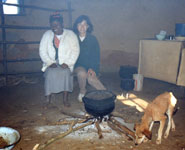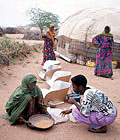
![]()
Search the Journey to Forever website – click HERE
|
Journey to Forever: Make a donation |
Contact usTo Keith Addison Handmade Projects |
Solar Box Cookers
Half the inhabitants of Earth cook over woodfires. Nearly half the world's wood supply is used as fuel. But there's not enough of it to go round -- more than 2 billion people now face shortages of fuelwood. The main victims of the fuelwood crisis are the women and children. It's a complex problem, like all environmental problems. But there's one simple answer, that can save millions of trees, provide clean, safe drinking water, doesn't smoke, and costs very little -- solar box cookers, which can be made from cardboard cartons. Solar box cookers produce no smoke and no pollution: woodsmoke from cooking fires causes respiratory infections which kill at least 5 million young children each year. The WHO says diseases spread through contaminated water cause 80% of the world's illnesses. Solar box cookers can pasteurize drinking water: heating water to 65 deg C for six minutes destroys disease organisms, and this temperature is easily achieved with solar box cookers. Solar box cookers would also save millions of women many hours (or days) wasted searching for firewood, giving them the time to look after their children, grow more food, and for education -- which is the key to reducing population growth. Solar box cookers cannot replace firewood use, just supplement it. Other possible supplements for rural use are biofuels, biogas, wind and water power.
Forests in the developing countries are shrinking by more than 15 million hectares a year. The critical forest-to-people ratio has never been lower -- worldwide, it is now less than half what it was in 1960.
The obvious answers are to plant more trees, and to stop people burning the trees that are left. But those in need do not have access to alternative fuels, and forestation schemes take years to produce their harvest -- if they work at all, which they often don't. In fact the schemes that work the best are those in which local communities are most involved and are the main beneficiaries. And the main local benefit is usually a sustained supply of firewood.

Smoke-filled rooms -- Midori and a Xhosa friend wait for dinner, cooking in a cast-iron pot over an open fire: Transkei, South Africa, 1997
-- "The best time to plant a tree was twenty years ago. The second best time is now." -- Anonymous
Meanwhile, deforestation leads to soil erosion, floods and climate change, severe environmental degradation, and increasing poverty and hunger.
The victims
-- "The search for fuel consumes the time, energy and health of women and their children. As local wood supplies grow scarce, women risk spinal column damage and uterine prolapse from carrying heavier loads over longer distances. Girls are often kept home from school to help their mothers gather wood, depriving them of educational opportunities. Where wood is unavailable, women cook with inefficient fuels such as animal dung or crop wastes, depriving livestock of fodder and soils of natural fertilizer. This endangers both the nutritional and respiratory health of women and their families." -- From "Forest Futures: Population, Consumption and Wood Resources" by Tom Gardner-Outlaw and Robert Engelman, Population Action International, 1999A solution
Research has found that 36% of the world's fuelwood needs (or 350 million tonnes of wood per year, according to UNICEF) could be replaced by solar box cookers, saving 500 kg of wood per family per year, equalling millions of trees.

Midori cooking rice by solar power in Hong Kong
-- "We are living and participating in a very strange system. Humanity has one foot stepping towards the stars, while the other is mired in a sinking sea of poverty. The distance between humanity's two feet is growing. We can help reverse the process by teaching several billion people in the Third World how to build and use solar box cookers." -- From "Balancing the Scales" by Bill Sperber
http://solarcooking.org/balance.htm
No fire, no smoke
-- "Women and children are most exposed to high levels of harmful smoke and suffer the most serious health damage ... studies in China found that smoke was a strong risk factor for lung cancer among non-smoking women ... in Gambia it was found that girls aged under five carried on their mother's back during cooking (in smoky cooking huts) had a six times higher risk of lung cancer -- a substantially higher risk factor than if their parents smoked." -- From "Cooking smoke: a pervasive killer in developing countries" WIN News, 1 January 1998

Solar panel cookers in Ethiopia
http://solarcooking.org/cookingsmoke.htm
Indoor smoke pollution now ranks 8th in health burden worldwide (lost years of healthy life), and ranks fourth in the "least-developed" countries (which make up about 40% of the world population) according to the World Health Organization's World Health Report 2002.
http://www.who.int/whr/en
"Smoke gets in their eyes" -- Independent research indicates that indoor air pollution is a contributory cause of around two million deaths in developing countries. Acute respiratory infections, ear and eye problems, breathlessness, chest pains, headaches and giddiness are just some of the symptoms that poor woman and children suffer in their rural homes. And the cause? Smoke from cooking. ITDG -- Intermediate Technology Development Group:
http://practicalaction.org/?id=smoke_gets_in_their_eyes_pr
Full report: "Reducing indoor air pollution in rural households in Kenya: working with communities to find solutions", ITDG project 1998-2001, January 2002. Acrobat file, 3.4Mb
http://www.itdg.org/html/advocacy/docs/smoke_project_report.pdfClean, safe water
-- "UNICEF estimates that 60% of rural families and 23% of urban families in developing countries are without safe water ... The most common recommendation is to boil the water. This recommendation is seldom followed [because of] the amount of scarce fuel it would require." -- From "A summary of water pasteurization techniques" by Dale Andreatta
http://solarcooking.org/pasteurization/solarwat.htmWomen's gain is everyone's gain
-- "On the first day, the women walk to the nearest place where wood can be gathered. On the second day, they search for firewood. The third day is spent carrying the wood on their backs home to the village." -- from Chad, Africa
Solar box cookers can even be used on cloudy days.
At least half a million solar box cookers are already in use, mostly in China and India, and projects are underway in most countries. UNICEF estimates the potential usage of solar box cookers at 200 million worldwide.

Rural women in Nepal harness the sun in a basket
Solar box cookers are easy to make -- one cooker designed to be simple enough for 10-year-olds to build without tools in less than an hour is now helping to feed refugees in Africa.
Other solutions
There is no feasible replacement for firewood in much of the world, nor is one required -- what is required is to balance growing demand with dwindling supplies.
Unlike fossil fuels, firewood is a renewable fuel, it's locally available, it supports local employment, and when properly burnt it doesn't contribute to the greenhouse effect -- the CO2 it releases is simply recycled.
But too often it isn't properly burnt: cooking fires are often inefficient, wasting energy, failing to combust the wood properly, contributing to greenhouse gas release and creating severe indoor smoke pollution.
Half the 3 billion people who use firewood don't have proper stoves or chimneys. Research and development efforts all over the world are working to remedy this problem.
More and better woodstoves mean less waste, more trees, better health and a better environment for all.
Second to firewood comes charcoal, which is an efficient, smokeless and clean fuel, but the charcoal production process is often inefficient and wasteful. Again, this is a focus of worthwhile development efforts in many countries.
At the root of all these problems, and of all development problems, is the grim spectre of poverty, now growing faster than ever before -- faster than the forests are shrinking, faster than the deserts are spreading -- and the cause of it is an unjust and inequitable economic system.*
Solar cooker resources on the web
Solar box cookers for schools
* At least 1 billion people go hungry in today's world.
The 1999 annual UN Human Development Report says the effects of globalization and increasing economic integration have led to the rich getting richer and the poor getting poorer in nearly every way.
UN statistics provide evidence of the widening gap between rich and poor:
-- In nine years, the income ratio between the top 20% and the bottom 20% has increased from 60:1 to 74:1.
-- Eighty countries have less revenue than they did a decade ago.
-- The assets of the world's 200 richest people exceed the combined income of 41% of the world's total population. (BBC World News, July 12, 1999)
The world's richest fifth consumes 86% of all goods and services while the poorest fifth consumes just 1.3%. (New York Times, 26 September, 1998, Week in Review)
Three billion people live on less than $2.00 a day. One billion people live on less than $1.00 a day. (World Bank)